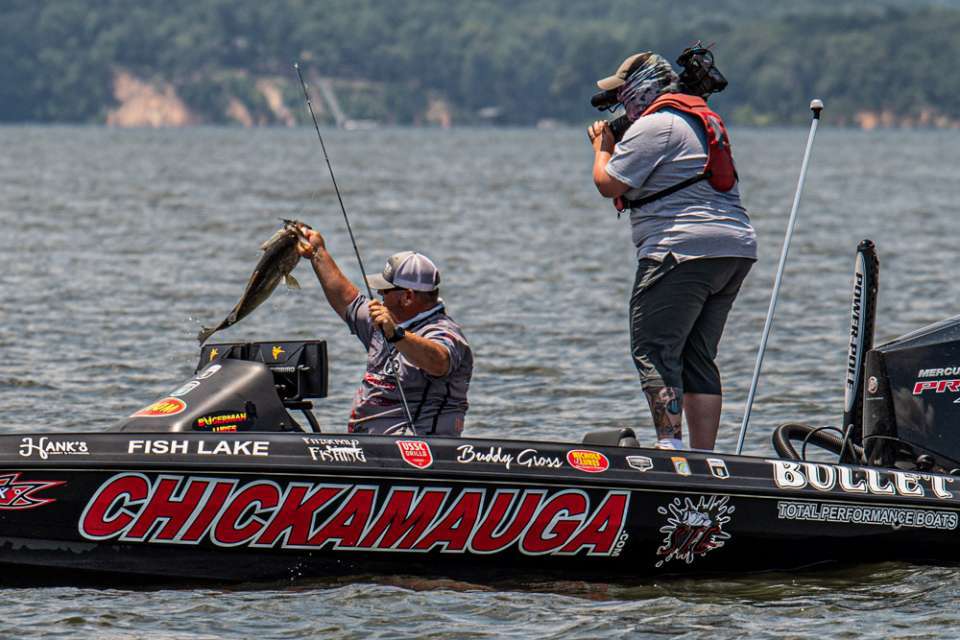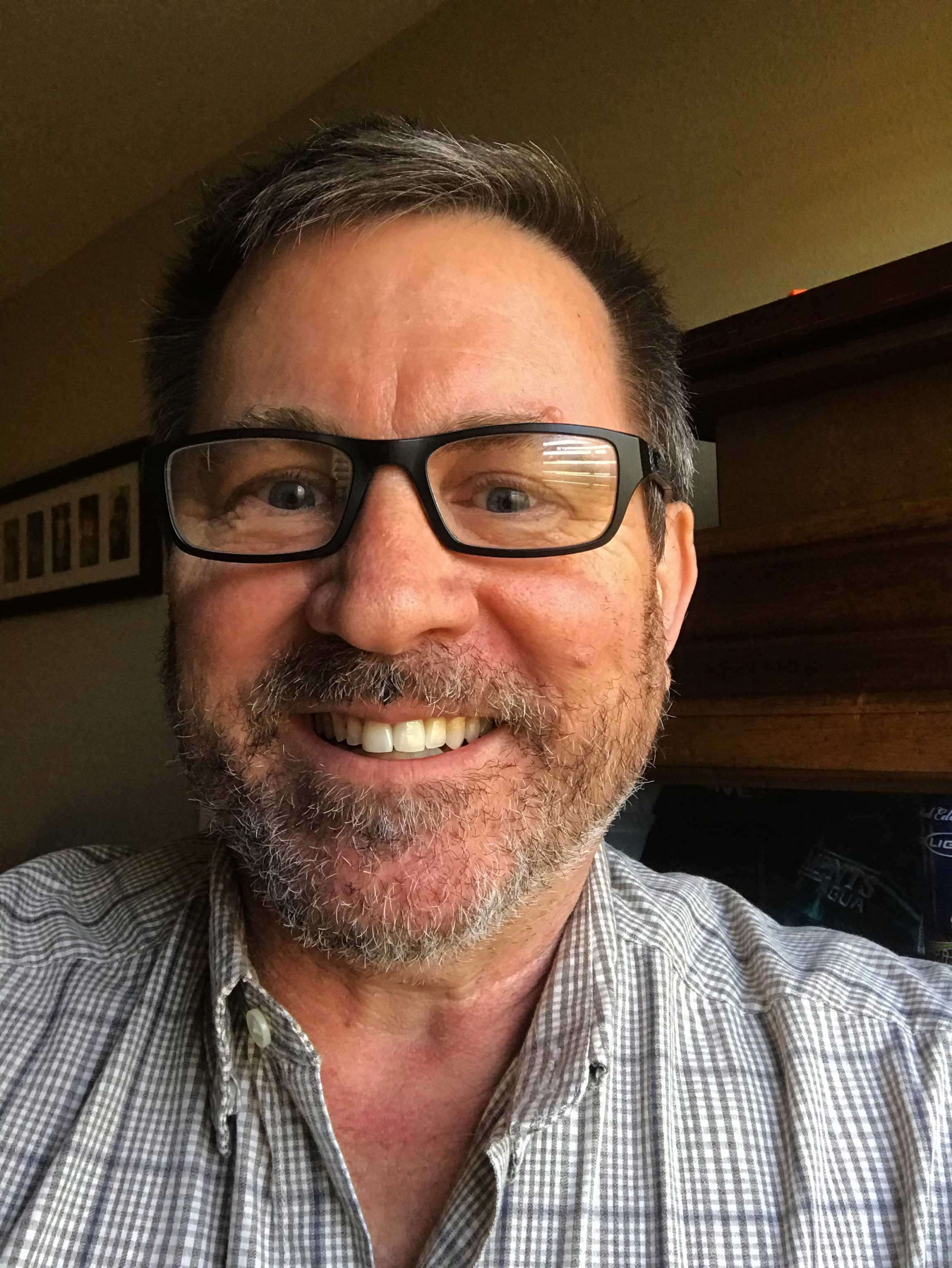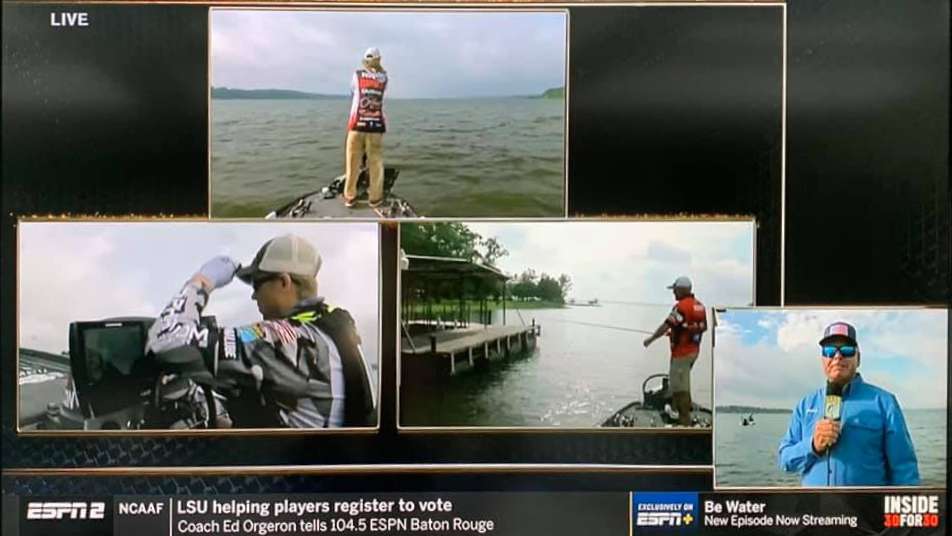
One small step for bass anglers, one giant leap for “basskind.”
No, it wasn’t as big as the moon landing, but the DEWALT Bassmaster Elite at Lake Eufaula airing on ESPN2 was monumental for the sport of bass fishing.
“I’ve gotten more positive comments in the past week than anything I’ve done on television in 20 years,” said Bassmaster TV analyst Mark Zona, who also hosts the award-winning Zona’s Awesome Fishing Show. “I hang around people who fish. I live on a lake in southern Michigan. It’s been staggering how many people have brought up that tournament to me, to my wife or my kids.
“It was one of the biggest steps for bass fishing that I’ve ever been a part of. I definitely felt the effect of it, from there being a much, much wider sport fan base.”
ESPN2, which as of 2018 was available in 86 million households, aired 19.5 of the 24 total hours that JM Associates in Little Rock produced from the Eufaula event. According to Nielson ratings, viewership reached 2.8 million, and minutes watched topped 85 million, more than all of last year’s LIVE total for 10 events.
“It’s the first time it’s aired on a cable channel and people could run into it,” longtime Bassmaster TV host Tommy Sanders said. “Now people have been exposed to it who had no idea. It might not be a total game-changer, but it’s a completely different critter.”
With the advent of cameras that could send video via cell coverage, Bassmaster LIVE began putting viewers in Elite competitors’ boats for the first time in 2015. Bass fishing fans heralded the coverage as it allowed them to watch the event unfold.
“When we started doing LIVE, that was one of those big steps forward for the sport of bass fishing,” said Mike McKinnis, executive producer and B.A.S.S. VP of media content. “In 2001, we did same-day coverage of the Classic, but we weren’t watching guys out on the water fishing.
“Both of those were important for their time, but what happened last week was the next step up. It was the point that live bass fishing is now the ultimate programming for our sport.”
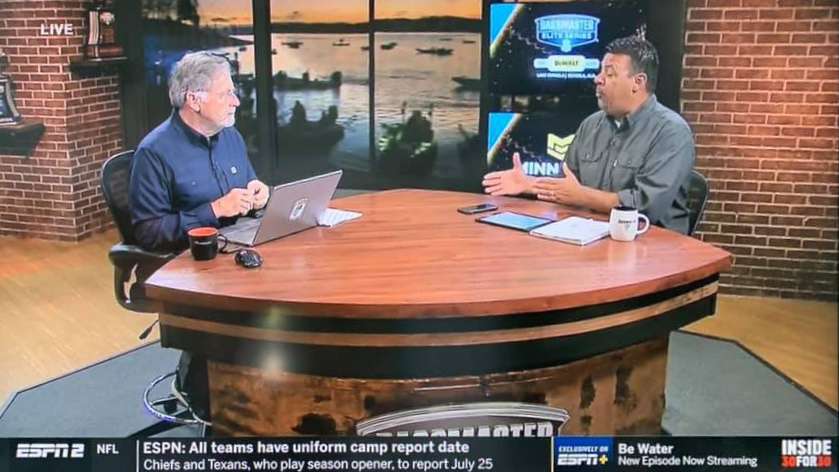
McKinnis has fostered the relationship with ESPN2 initiated by his father, Jerry McKinnis, whose The Fishin’ Hole show aired on the network for decades and helped his company create ESPN Outdoors. With the COVID-19 pandemic halting major sports, McKinnis worked with ESPN2 to deliver a programming void as the Elites resumed their revised schedule.
All indications are the four days were a success for both B.A.S.S and ESPN2, as viewers hungry for live events tuned in and hopefully discovered a hidden gem in the competition and inherit drama of tournament fishing.
“It isn’t that our sport is NASCAR or NFL now, it was because the whole thing was packaged and put out on a network,” McKinnis said. “Over the course of 20 hours, a large group of people came through and saw our programming.”
Sanders, who hosted the weekend blocks of outdoors programming on ESPN2, was astounded by the viewing reports.
“Just the sheer number of minutes watched is staggering, when it outstrips your whole season,” he said. “ESPN2 is a destination where people go for live sports. For the last three months, maybe they kept checking to see if the cupboard was still there. It was great to be a drought breaker on the same weekend the PGA Tour cranked up. It was great to be a little more intrusive in their households.”
Live bass fishing on a major cable network is being heralded by many in the industry. Mark Copley, director of pro staff and media relations for Lew’s and Strike King, borrowed a line from Doug Minor, the former head of sales, to describe the impact.
“He would say, ‘A high tide floats all boats.’ We are on a high tide right now,” Copley said. “It’s really good to see. Most everybody is seeing sales when we thought things might be down. I think things are not as bad off as thought, to even somewhat above.”
Jeff Kolodzinski, Humminbird brand manager at Johnson Outdoors, said the event paid big dividends for the sport, as well as his company. The Humminbird brand of fishing electronics was created by Tom Mann on Lake Eufaula and are still manufactured there, and its 360 Imaging was featured on the broadcasts to show how competitors targeted bass.
Kolodzinski said he believes there’s a correlation behind the national trend of more people fishing during the corona virus shutdown and the viewers tuning into fishing.
“With the country’s awfully difficult months, we’ve seen more people fish state by state … license sales have soared. It’s part of our nation’s heritage,” he said. “B.A.S.S. is serving as a great steward by expanding the coverage on ESPN2, getting people excited and showing how pros are doing it.”
Copley agrees.
“It’s almost like reintroducing fishing to the nation,” he said. “You don’t get those opportunities often. We’re in a unique time in our history as a country. People are stuck at home, and they’re looking for things to do. I’m just glad ESPN had the foresight to use B.A.S.S. as a springboard. I think it was a win-win for our industry.”
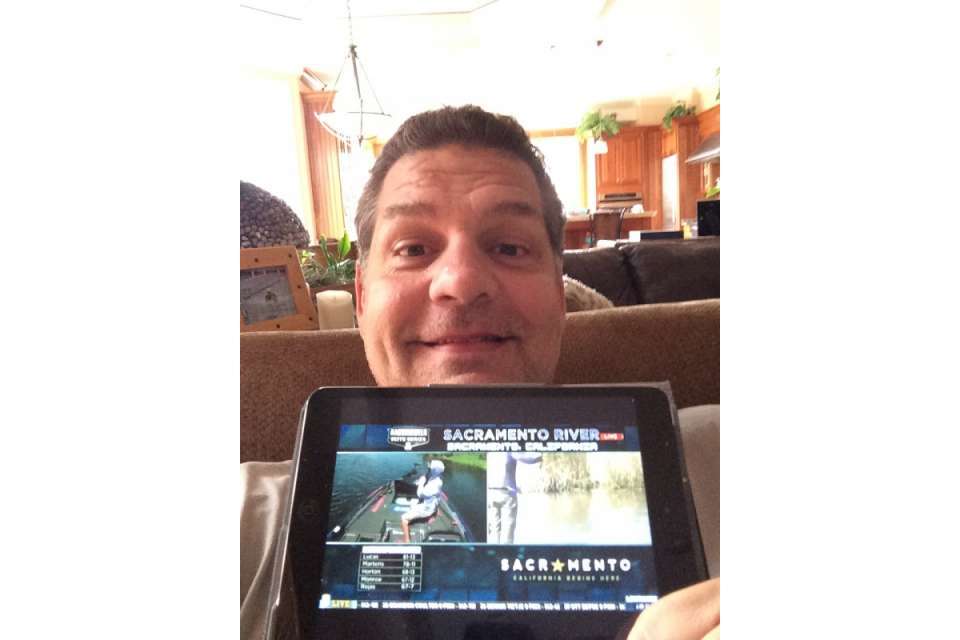
It was a big win for Buddy Gross, a 47-year-old Elite rookie who was the final qualifier for Championship Saturday and rallied with the big bag of the event. The dramatic storyline elicited ESPN host Mike Golic to proclaim Gross “won the weekend” on Monday’s Golic and Wingo show.
“That didn’t hurt — 10th place and he came back and won it with a 7-pounder and a 6-pounder,” McKinnis said. “That’s why Golic chimed in. Of course, he’s a bass ambassador. He loves the sport, enjoys following it. He followed Buddy Gross’s day and that’s why he said what he said on his show.”
Golic, who aired his morning radio show from several Bassmaster Classics, exchanged texts with Zona after the event, congratulating him on the coverage. The Bassmaster LIVE broadcast began immediately after Golic’s show, and Copley for one believes that helped expose bass fishing to new viewers.
“People didn’t even have time to change the channel. ‘Let’s watch it a little bit,’ and maybe some got hooked,” he said. “What was nice — I watched quite a bit of it — was how the pros, every time they had an opportunity with a camera in their boat, they ran with it. In the past, they’re so quiet because they don’t want anybody knowing their secrets.”
Sanders, who has hosted Bassmaster TV since before the Elite circuit began, said the extensive coverage allowed viewers to fully see how anglers go about their business, from their mindset, decision-making and tactics to their successes and failures.
“You really get a sense of how the sport works,” he said, “instead of a cavalcade of catches” on the post shows.
Zona, a stalwart in the industry with connections beyond his huge fishing circle, remained blown away by all the positive comments.
“It was very comparable to several Classics that I’ve been able to cover,” he said. “I know the responses I get after a Classic airs, and this was bigger than that. Bass fishing was introduced to a much larger crowd during the week, and that’s good for all of us who follow the sport.”
After the tournament ended, McKinnis texted his crew for their fantastic work.
“Thank you for making us look good to the entire industry,” he wrote. “We’ve changed our sport yet again … This one was for Dad!”
While attempts to get July’s New York swing aired on ESPN2 is in the works, there was still some glow from producing a well-watched show on a major cable network and the ripples it’s creating in the bass world.
“The point really is, it didn’t matter which spoke of the wheel you were on the fishing industry, that was a moment right there,” McKinnis said. “B.A.S.S. just did something … again.”
